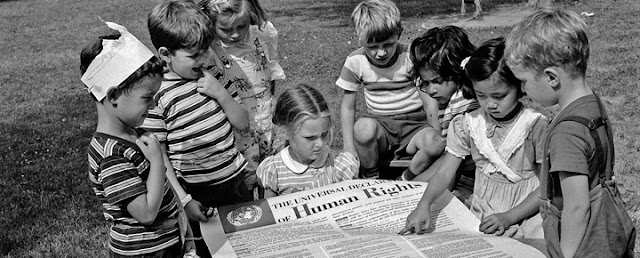Hernan Santa Cruz, Chilean member of the drafting committee, 1948
There was real hope after the second world war that the human atrocities perpetuated during the second world war (1940-1945) would never occur again.....by law. The unanimous adoption (with some abstentions) of the Universal Declaration of Human Rights also heralded a new era of optimism and a kind of enlightened attitude (inspired by Eleanor Roosevelt), in which the United Nations would settle disputes and the USA was the new world leader, liberal, freedom loving and different from any empire that bit he dust before.
 |
| a wave of optimism |
Today the actual force of content of this declaration has all been falling by the wayside. Though the words 'human rights' are frequently used in news papers of stature, thanks to Bush and his cronies Cheney and Rumsfeld, torture --perhaps the most comprehensive transgression of human rights-- has become a way of war and a career for many. Extra judicial killings perpetuated by the presidency of Obama, and facilitated by drone warfare are now a commonplace, almost daily occurrence. Hardly anyone raises an eyebrow that once more we are ruled by blood thirsty murderers parading in civilian clothes, who know most certainly that the attorney general of the USA will not prosecute. However, let there be no doubt: crimes against humanity do exist and violations of human rights are crimes. One day, heinous acts will once more be recognized as heinous crimes. With 7 billion of us justice can no longer just be a matter of brute power, if humanity wants to have a future at all. Treaty law actually surpasses national law --it is the supreme law of the land. It is up to us to give it teeth.
What I am suggesting here is to once more give meaning to this document: the Universal Declaration of Human Rights. Yes, this is a legal document and presumably dry --however it is not: it is amazingly accessible. One can see how much the drafters tried to make human rights easy to grasp: in 30 small paragraphs, laws that represent the highest human aspirations are laid out for the masses. But just in case these paragraphs are not simple and clear enough, the panel took the trouble to distill these principles once again. Here I will give you the whole summary of the Universal Declaration of Human Rights. Why? Because I believe this is a profound testament to our own humanity: this is what we all agreed upon as a human family. Hopefully in this manner this document will come alive for you and becomes a useful tool in challenging the injustices we are facing globally now, including assaults on your own liberty and ability to express yourself. What are your rights brother ? Only if you know, you can move from warfare to "lawfare". We will see this move in many areas that are increasingly intertwined with human rights such as issues of global warming, nuclear proliferation, mining, poverty, health, economic development, education, employment, inequality, etc. This new framing of the issues in the light of human rights, gives impetus also for action.
Let's examine article 1, arguably the foundation of all other principles.
article 1: All humans are born free and equal in dignity and rights. They are endowed with reason and conscience and should act toward one another in a spirit of brotherhood
Here I will stick to the abbreviated versions of the 30 different articles. But if you 'd like to see the whole version, click here.
- Right to Equality
- Freedom from discrimination
- Right to life, liberty and personal security
- Freedom from slavery
- Freedom from torture and degrading treatment
- Right to recognition as a person before the law
- Right to equality before the law
- Right to remedy by competent tribunal
- Freedom from arbitrary arrest and exile
- Right to fair public hearing
- Right to be considered innocent until proven guilty
- Freedom from interference with privacy, family, home and correspondence
- Right to free movement in and out of the country
- Right to asylum in other countries from persecution
- Right to a nationality and freedom to change nationality
- Right to mariage and family
- Right to own property
- Freedom of belief and religion
- Freedom of opinion and information
- Right to peaceful assembly and association
- Right to participate in government and in free elections
- Right to social security
- Right to desirable work and to join trade unions
- Right to rest and leisure
- Right to adequate living standard
- Right to education
- Right to participate in the cultural life of community
- Right to a social order that articulates this document
- Community duties essential to free and full development
- Freedom from state or personal interference in the above rights
Well....here they are. When people talk about human rights, this is what they are really talking about. Obviously this is not the world we live in ...but it should be, since these are the basic principles we agreed upon with all nations. Laws that insure our ability to flourish fully as human beings. These laws will only gain force in the shifting narrative of history, if we, the 99%, become much more aware of their content and insist that these laws have meaning in our daily lives. They are the Law.
AMEN to that, Brother!!
ReplyDeleteIt should be more than only words, Willem,
ReplyDeleteit should be lived or those words - International Law articles etc. - have no value at all !
In Peace,
Ak Malten
This is what I wrote a Friend today:
Remember:
" If we All should equally share our inner Peace, kindness etc. with nature; family and our neighbors there would be no destruction, no degradation, no war, no nuclear weapons, just harmony and Peace. "